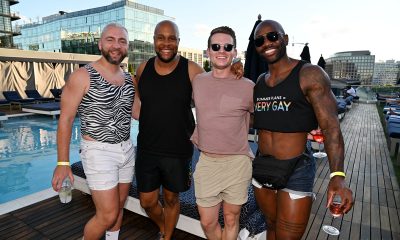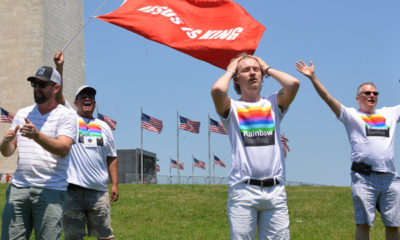District of Columbia
Catching up with the asexuals and aromantics of D.C.
Exploring identity and finding community

There was enough commotion in the sky at the Blossom Kite Festival that bees might have been pollinating the Washington Monument. I despaired of quickly finding the Asexuals and Aromantics of the Mid-Atlantic—I couldn’t make out a single asexual flag among the kites up above. I thought to myself that if it had been the Homosexuals of the Mid-Atlantic I would’ve had my gaydar to rely on. Was there even such a thing as ace-dar?
As it turned out, the asexual kite the group had meant to fly was a little too pesky to pilot. “Have you ever used a stunt kite?” Bonnie, the event organizer asked me. “I bought one. It looked really cool. But I can’t make it work.” She sighed. “I can’t get the thing six feet off the ground.” The group hardly seemed to care. There was caramel popcorn and cookies, board games and head massages, a game of charades with more than its fair share of Pokémon. The kites up above might as well have been a coincidental sideshow. Nearly two dozen folks filtered in and out of the picnic throughout the course of the day.
But I counted myself lucky that Bonnie picked me out of the crowd. If there’s such a thing as ace-dar, it eludes asexuals too. The online forum for all matters asexual, AVEN, or the Asexual Visibility and Education Network, is filled with laments: “I don’t think it’s possible.” “Dude, I wish I had an ace-dar.” “If it exists, I don’t have it.” “I think this is just like a broken clock is right twice a day type thing.” What seems to be a more common experience is meeting someone you just click with—only to find out later that they’re asexual. A few of the folks I met described how close childhood friends of theirs likewise came out in adulthood, a phenomenon that will be familiar to many queer people. But it is all the more astounding for asexuals to find each other this way, given that asexual people constitute 1.7% of sexual minorities in America, and so merely .1% of the population at large.
To help other asexuals identify you out in the world, some folks wear a black ring on their middle finger, much as an earring on the right ear used to signify homosexuality in a less welcoming era. The only problem? The swinger community—with its definite non-asexuality—has also adopted the signal. “It’s still a thing,” said Emily Karp. “So some people wear their ace rings just to the ace meet-ups.” Karp has been the primary coordinator for the Asexuals and Aromantics of the Mid-Atlantic (AAMA) since 2021, and a member of the meet-up for a decade. She clicked with the group immediately. After showing up for a Fourth of July potluck in the mid-afternoon, she ended up staying past midnight. “We played Cards against Humanity, which was a very, very fun thing to do. It’s funny in a way that’s different than if we were playing with people that weren’t ace. Some of the cards are implying, like, the person would be motivated by sex in a way that’s absurd, because we know they aren’t.”
Where so many social organizations withered during the pandemic, the AAMA flourished. Today, it boasts almost 2,000 members on meetup.com. Karp hypothesized that all the social isolation gave people copious time to reflect on themselves, and that the ease of meeting up online made it convenient as a way for people to explore their sexual identity and find community. Online events continue to make up about a third of the group’s meet-ups. The format allows people to participate who live farther out from D.C. And it allows people to participate at their preferred level of comfort: while many people participate much as they would at an in-person event, some prefer to watch anonymously, video feed off. Others prefer to participate in the chat box, though not in spoken conversation.
A recent online event was organized for a discussion of Rhaina Cohen’s book, “The Other Significant Others,” published in February. Cohen’s book discusses friendship as an alternative model for “significant others,” apart from the romantic model that is presupposed to be both the center and goal of people’s lives. The AAMA group received the book with enthusiasm. “It literally re-wired my brain,” as one person put it. People discussed the importance of friendship to their lives, and their difficulties in a world that de-prioritized friendship. “I can break up with a friend over text, and we don’t owe each other a conversation,” one said. But there was some disagreement when it came to the book’s discussion of romantic relationships. “It relegates ace relationships to the ‘friend’ or ‘platonic’ category, to the normie-reader,” one person wrote in the chat. “Our whole ace point is that we can have equivalent life relationships to allo people, simply without sex.” (“Allo” is shorthand for allosexual or alloromantic, people who do experience sexual or romantic attraction.)
The folks of the AAMA do not share a consensus on the importance of romantic relationships to their lives. Some asexuals identify as aromantic, some don’t. And some aromantics don’t identify as asexual, either. The “Aromantic” in the title of the group is a relatively recent addition. In 2017, the group underwent a number of big changes. The group was marching for the first time in D.C. Pride, participating in the LGBTQ Creating Change conference, and developing a separate advocacy and activism arm. Moreover, the group had become large enough that discussions were opened up into forming separate chapters for D.C., Central Virginia, and Baltimore. During those discussions, the group leadership realized that aromantic people who also identified as allosexual didn’t really have a space to call their own. “We were thinking it would be good to probably change the name of the Meetup group,” Emily said. “But we were not 100% sure. Because [there were] like 1,000 people in the group, and they’re all aces, and it’s like, ‘Do you really want to add a non-ace person?’” The group leadership decided to err on the side of inclusion. “You know, being less gatekeep-y was better. It gave them a place to go — because there was nowhere else to go.”
The DC LGBT Center now sponsors a support group for both asexuals and aromantics, but it was formed just a short while ago, in 2022. The founder of the group originally sought out the center’s bisexual support group, since they didn’t have any resources for ace folks. “The organizer said, you know what, why don’t we just start an ace/aro group? Like, why don’t we just do it?” He laughed. “I was impressed with the turnout, the first call. It’s almost like we tapped into, like, a dam. You poke a hole in the dam, and the water just rushes out.” The group has a great deal of overlap with the AAMA, but it is often a person’s first point of contact with the asexual and aromantic community in D.C., especially since the group focuses on exploring what it means to be asexual. Someone new shows up at almost every meeting. “And I’m so grateful that I did,” one member said. “I kind of showed up and just trauma dumped, and everyone was really supportive.”
Since the ace and aro community is so small, even within the broader queer community, ace and aro folks often go unrecognized. To the chagrin of many, the White House will write up fact sheets about the LGBTQI+ community, which is odd, given that when the “I” is added to the acronym, the “A” is usually added too. OKCupid has 22 genders and 12 orientations on its dating website, but “aromantic” is not one of them — presumably because aromantic people don’t want anything out of dating. And since asexuality and aromanticism are defined by the absence of things, it can seem to others like ace and aro people are ‘missing something.’ One member of the LGBT center support group had an interesting response. “The space is filled by… whatever else!” they said. “We’re not doing a relationship ‘without that thing.’ We’re doing a full scale relationship — as it makes sense to us.”
CJ Higgins is a postdoctoral fellow with the Alexander Grass Humanities Institute at Johns Hopkins University.
District of Columbia
D.C. Council member proposes change for Mayor’s Office of LGBTQ Affairs
Parker also seeks increased funding for LGBTQ programs in FY 2025 budget
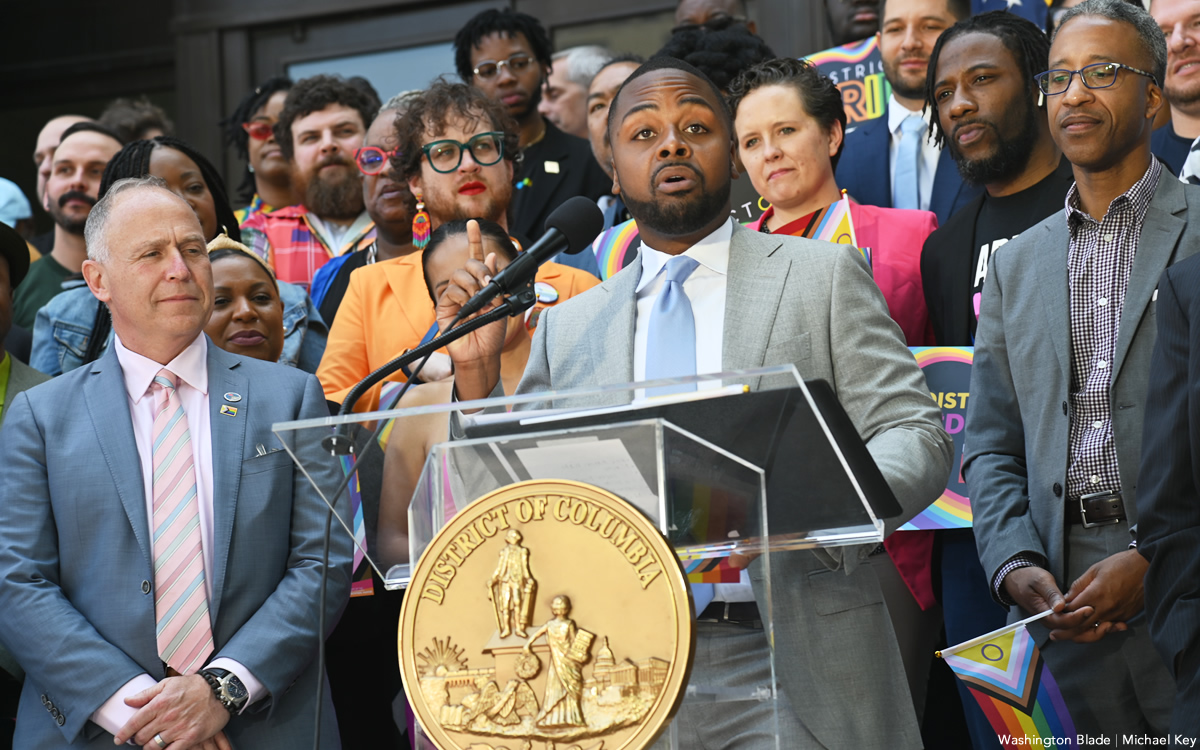
D.C. Council member Zachary Parker (D-Ward 5), the Council’s only LGBTQ member, has asked his fellow Council members to support a proposal to change the Mayor’s Office of LGBTQ Affairs to become a “stand-alone entity outside the Executive Office of the Mayor to allow for greater transparency and accountability that reflects its evolution over the years.”
In an April 30 letter to each of his 12 fellow Council members, Parker said he plans to introduce an amendment to the city’s Fiscal Year 2025 Budget Support Act to make this change for the LGBTQ Affairs Office.
His letter also calls for adding to the city’s FY 2025 budget two specific funding proposals that local LGBTQ activists submitted to D.C. Mayor Muriel Bowser that the mayor did not include in her budget proposal submitted to the Council. One calls for $1.5 million to fund the completion of the build out and renovation for the D.C. Center for the LGBTQ Community’s new building in the city’s Shaw neighborhood and $300,000 in subsequent years to support the LGBTQ Center’s operations.
Parker’s second budget proposal calls for what he said was about $450,000 to fund 20 additional dedicated LGBTQ housing vouchers as part of the city’s existing program to provide emergency housing support for LGBTQ residents and other residents facing homelessness.
“The Office of LGBTQ+ Affairs currently manages about 90 vouchers across various programs and needs,” Parker said in his letter to fellow Council members. “Adding an additional 20 vouchers will cost roughly $450,000,” he wrote, adding that dedicated vouchers “play a crucial role in ensuring LGBTQ+ residents of the District can navigate the complex process of securing housing placements.”
In her proposed FY ’25 budget, Bowser calls for a 7.6 percent increase in funding for the Office of LGBTQ Affairs, which amounts to an increase of $132,000, bringing the office’s total funding to $1.7 million.
“To be clear, I support the strong work and current leadership of the Office of LGBTQ+ Affairs,” Parker says in his letter to fellow Council members. “This push for change is in recognition of the office’s notable achievements and the significant demands being placed on it, which require a greater level of accountability.”
Parker told the Blade in an April 30 telephone interview that he believes Japer Bowles, the current director of the Office of L|GBTQ Affairs is doing an excellent job in operating the office, but he believes the office would be able to do more for the LGBTQ community under the change he is proposing.
“Making it a stand-alone office versus it being clustered within the Community Affairs division of the mayor’s office, it will get more attention,” Parker told the Blade. “The leadership will have greater flexibility to advocate for the interest of LGBTQ residents, And we will be able to conduct greater oversight of the office,” he said, referring to the Council’s oversight process.
Parker noted that other community constituent offices in the mayor’s office, including the Office of Latino Affairs and the Office of Veterans Affairs are stand-alone offices that he hopes to bring about for the LGBTQ Affairs Office. He said Council member Brianne Nadeau, who chairs the Council committee that has oversight for the LGBTQ Affairs Office, has expressed support for his proposal.
Also expressing support for Parker’s proposal to make the LGBTQ Affairs Office a stand-alone office is the D.C. Advisory Neighborhood Commission Rainbow Caucus. Vincent Slatt, the caucus’s chairperson, submitted testimony last week before the D.C. Council Committee on Public Works and Operations, which is chaired by Nadeau, calling for making the LGBTQ Affairs Office a stand-alone office outside the Executive Office of the Mayor.
Slatt also stated in his testimony that the office has a “chronic staffing shortage” and recommended that at least three additional staff members be assigned to the office.
Daniel Gleick, the mayor’s press secretary, told the Blade the mayor’s office is reviewing Parker’s budget proposals, including the proposed change for the Office of LGBTQ Affairs.
But in testimony at a May 1, D.C. Council budget hearing before the Council’s Committee on Executive Administration and Labor, Lindsey Parker, Mayor Bowser’s Chief of Staff, appeared to express skepticism over making the LGBTQ Affairs office a stand-alone office. Lindsey Parker expressed her thoughts on the proposed change when asked about it by Councilmember Anita Bonds (D-At-Large), who chairs the committee that held the hearing.
“I would proffer that it doesn’t matter whether the agency is within the EOM [Executive Office of the Mayor] or not,” Lindsey Parker told Bonds. “They will still be reporting up into one would argue the most important agency in the D.C. government, which is the one that supports the mayor,” Lindsey Parker said. “So, it’s the closest to the mayor that you can get,” she said “So, you could pull it out and have a different budget chapter. I actually think that’s confusing and convoluted.”
Lindsey Parker added, “The Mayor’s Office of LGBTQ Affairs, with their six FTEs right now, if they were a stand-alone function they wouldn’t have all the non-personnel services in order to operate. They need to be under sort of the shop of the EOM in order to get those resources.”
By FETs Lindsey Parker was referring to the term Full Time Equivalent employees.
District of Columbia
As You Are bar closes temporarily, citing problems with building
Shutdown comes two months after fundraising appeal brought in $170,000
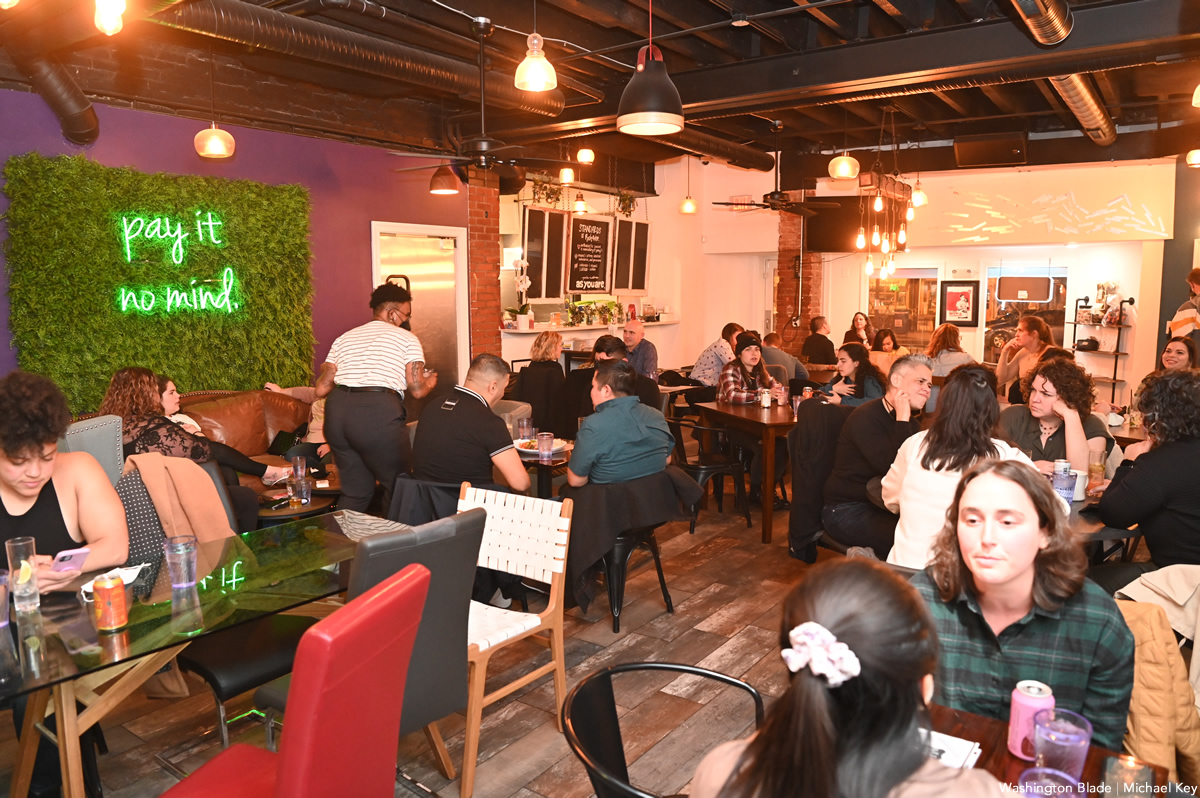
As You Are, the LGBTQ café and bar located in the Barracks Row section of Capitol Hill near the Eastern Market Metro station, has announced on its Instagram page that problems associated with its building at 500 8th St., S.E., forced it to “temporarily” close on April 8.
“As you may be aware, As You Are’s location in Eastern Market has been closed since April 8, when we began to have concerns about the physical condition of the building,” the Instagram message states. “We worked quickly to alert our landlord, and they have assessed the building with their engineers,” the message says.
“We understand that certain repairs need to be made to ensure the safety of our staff, patrons, and community,” the message concludes.
In one of two more recent videos posted on Instagram on April 17 and 26, As You Are co-owners Jo McDaniel and Rachel Pike said they did not have any update on when they can reopen. “The engineers and contractors have all come into the space, and we’re just waiting on a plan and a timeline from our landlord,” McDaniel said in the video.
Pike mentioned in one of the videos that As You Are has a Venmo app set up, and said they appreciate the support they have been receiving from the community. McDaniel added, “We’re really interested in supporting our team through this, as this is an unexpected loss of income for all of us.”
McDaniel didn’t immediately respond to a request from the Washington Blade for a further update on where things stand with the building repair project and the specific nature of the problems with the building. An earlier message posted on the As You Are website said, “Heavy rain damaged the back wall of our building, and we are closed to assess and repair.”
The message added, “Regular updates and ways to support can be found on our Instagram page @asyouaredc.”
The April 8 shutdown came a little over two months after As You Are issued a GoFundMe appeal on Feb. 5 seeking emergency financial support to prevent it from closing in February due to a $150,000 debt. In a display of strong community support, its $150,000 fundraising goal was reached in less than a week. By the following week, the GoFundMe appeal had pulled in more than $170,000 from more than 3,000 individual donations.
Many of the donors left messages on the GoFundMe page for As You Are expressing their strong support for the bar and café, saying it served as a uniquely supportive space for all members of the LGBTQ community.
In the GoFundMe message, McDaniel and Pike said their goal in opening their business in March 2022 was to offer community center type programming beyond just a bar and café.
“AYA is a café, bar and dance floor that hosts diverse programming nearly every night of the week, including social sport leagues, Queer youth socials, weekly karaoke, book clubs, open mics, Queer author events, dance parties, and much more,” the two said in their message.
The building’s owner and the As You Are landlord, Rueben Bajaj, who is the principal operator of the Bethesda, Md., based real estate firm White Star Investments, couldn’t immediately be reached for comment. The Washington Post reported that he contributed $500 to the As You Are GoFundMe appeal, saying, “I personally want to see As You Are succeed.”
District of Columbia
Weekend brings two shootings in U Street, Dupont Circle areas
Man dies after incident at Desperados

A man was shot to death shortly after 1 a.m. on Saturday, April 27, inside the Desperados Burgers & Bar at 1342 U St., N.W., which is located on the same block a short distance away from the LGBTQ nightclub Bunker D.C. and around the corner less than a block away from the recently opened LGBTQ bar Crush on 14th Street, N.W.
The incident prompted Bunker to post on its Facebook page a message saying its security team quickly ushered patrons standing outside to enter the club and as a precautionary measure prevented patrons from leaving until it was deemed safe to do so.
A D.C. police statement identifies the shooting victim as Kenneth Goins, 43, of Salisbury, Md. The statement says officers on patrol in the 1300 block of U Street, N.W. heard gunshots at about 1:12 a.m. and immediately arrived at Desperados to investigate the incident.
“Officers located a man inside with multiple gunshot wounds,” the statement says. “Despite all life saving efforts, the victim was pronounced dead on the scene,” it says. Neither the statement nor a police incident report pertaining to the shooting provides a description of the person who committed the shooting nor discloses whether any of the customers inside the restaurant and bar witnessed the shooting.
The statement says the police Homicide Branch is investigating the shooting and urges anyone with knowledge of the incident to call police at 202-272-9099. Like all homicide cases, it says the D.C. Metropolitan Police Department offers a reward of up to $25,000 to anyone who provides information that leads to the arrest and conviction of the person or persons responsible for a homicide committed in the District.
“There was a shooting incident on U ST. N.W., just 4 doors down from BUNKER,” the Bunker Facebook post says. “Our security team promptly responded, ensuring the safety of everyone by ushering them inside for cover,” it says. “Currently, the courageous police officers are outside, handling the situation and working diligently to maintain a secure environment for our guests,” the message continues.
“As a responsible establishment, we strongly prioritize your safety, and as a precautionary measure, we will not permit anyone to exit the building until we deem it safe to do so,” the posting says. “Rest assured, we, as the owners, take this matter very seriously, and your safety remains our highest priority.”
The U Street shooting at Desperados Burgers & Bar took place a little over two hours after six people were shot and wounded outside the Decades nightclub at 1219 Connecticut Ave., N.W. near Dupont Circle and near several gay bars on P Street and 17th Street in the Dupont Circle area. Police said none of those who were shot suffered life-threatening injuries
A separate police statement says with the help of several witnesses, police identified and arrested Rennwel Mantock, 29, of Hyattsville, Md., in connection with the shooting on charges of Assault with Intent to Kill, Possession of Unregistered Ammunition, and Possession of an Unregistered Firearm. The statement says a gun belonging to Mantock was recovered on the scene. Court records show a judge has ordered him to be held without bond until a May 7 preliminary hearing.
“The detectives’ investigation determined Mantock opened fire after employees removed him from a nightclub following a dispute,” according to the statement.
A police arrest affidavit filed in D.C. Superior Court says Mantock told police at the time he was apprehended on the scene that he was dancing with a woman at the club when a security guard ordered him to leave and then “grabbed him by the neck and punched him in the face right before dragging him down the steps.” The Decades club states on its website that it has several floors with multiple bars.
According to the arrest affidavit, Mantock told police that one of the security officials punched him in the face again and threw him to the ground after dragging him out the door. It says Mantock “stated that he then pulled out his gun and started shooting” because “he was very upset about the security punching him in the face,” adding that he “began firing at the Decades’ security.”
The affidavit says five of the six people shot were Decades employees.
Gay former Dupont Circle Advisory Neighborhood Commissioner Mike Silverstein, who lives near where the shooting took place, said Decades is not known as a place that LGBTQ people patronize but said the surrounding neighborhood is home to many LGBTQ residents and draws many LGBTQ visitors.
-
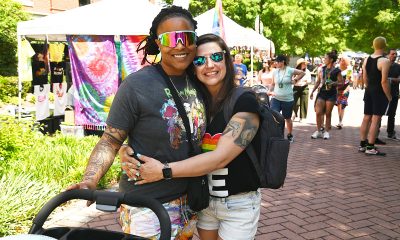
 a&e features4 days ago
a&e features4 days agoPride season has begun
-

 Federal Government5 days ago
Federal Government5 days ago4th Circuit rules gender identity is a protected characteristic
-
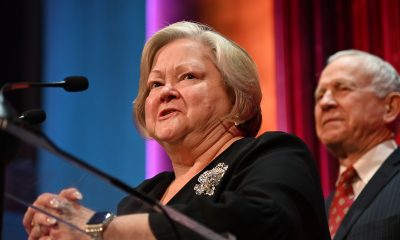
 The White House2 days ago
The White House2 days agoJudy Shepard to receive Presidential Medal of Freedom
-
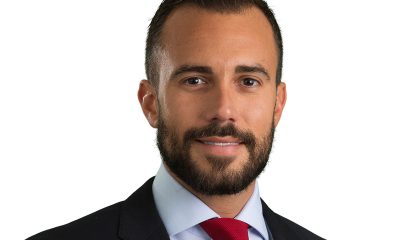
 World4 days ago
World4 days agoNew World Bank US executive director: LGBTQ rights are human rights



